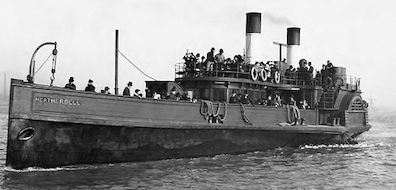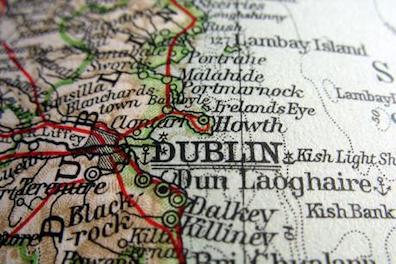The Erin's King, mentioned in five chapters of Ulysses,
was a paddlewheel steamship used for sightseeing excursions in
Dublin Bay from 1891 to 1900. For one shilling, tourists could
sail around the Kish Lightship east of
Dublin, steam over to Ireland's Eye on the other side of the
Howth peninsula, and then return to Dublin. The trip took
about two hours.
According to a brief article on the Afloat website
(afloat.ie), the Heather Bell was built in 1865 by T.
Vernon & Son of Liverpool and served as a ferry on the
River Mersey between Liverpool and Wallasey. In 1891 a man
named Ward bought the ship, renamed it Erin's King,
and put it to use as a seagoing cruise ship. (It seems likely
that Mr. Ward was a Parnellite, since Charles Stewart Parnell,
whose downfall as leader of the Irish Parliamentary Party came
in 1891, was known as "Erin's uncrowned king"––a phrase
that Bloom recalls in Eumaeus.) Gifford writes that
the ship sailed from the Custom House quay several times a day
in the summer. Slote, Mamigonian, and Turner, however, quote
from an ad in the 10 June 1897 Freeman's Journal announcing
only one departure on June 11 and two on June 12, a Saturday.
The Lloyd's Register of 1901 records that the ship was
scrapped the year before.
In Calypso Bloom remembers the "Damned old tub
pitching about," but Milly did not suffer the fate of
those "lovely seaside
girls"–– seasickness. In Nausicaa he
reflects that her spirits contrasted with those of the adults
on the ship: "Day we went for the pleasure cruise in the
Erin's King.... Drunkards out to shake up their livers.
Puking overboard to feed the herrings. Nausea. And the women,
fear of God in their faces. Milly, no sign of funk. Her blue
scarf loose, laughing. Don't know what death is at that age."
The memory comes back one last time in Eumaeus: "the
Irish lights, Kish and others, liable to
capsize at any moment, rounding which he once with his
daughter had experienced some remarkably choppy, not to say
stormy, weather."
Bloom also recalls the ship in Lestrygonians, after
he throws a crumpled paper into the Liffey to see if the gulls
will go for it: "the day I threw that stale cake out of the
Erin's King picked it up in the wake fifty yards
astern." In Circe the ship floats into view under her
own steam, independent of human memories: "(Far out in the
bay between Bailey and Kish lights the Erin's King sails,
sending a broadening plume of coalsmoke from her funnel
towards the land.)"

